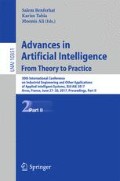Abstract
We propose a new approach to detect credit card fraud based on suspicious payment patterns. According to our hypothesis fraudsters use stolen credit card data at specific, recurring sets of shops. We exploit this behavior to identify fraudulent transactions. In a first step we show how suspicious patterns can be identified from known compromised cards. The transactions between cards and shops can be represented as a bipartite graph. We are interested in finding fully connected subgraphs containing mostly compromised cards, because such bicliques reveal suspicious payment patterns. Then we define new attributes which capture the suspiciousness of a transaction indicated by known suspicious patterns. Eventually a non-linear classifier is used to assess the predictive power gained through those new features. The new attributes lead to a significant performance improvement compared to state-of-the-art aggregated transaction features. Our results are verified on real transaction data provided by our industrial partner (Worldline http://www.worldline.com).
Access this chapter
Tax calculation will be finalised at checkout
Purchases are for personal use only
Notes
- 1.
[3, Tables 6c, 7c] reports for another dataset a precision of 0.233, a precision at k of 0.494, a recall of 0.747, an accuracy of 0.987 and an AUC of 0.934.
References
Aggarwal, C.C., Han, J.: Frequent Pattern Mining. Springer, Heidelberg (2014)
Agrawal, R., Imieliński, T., Swami, A.: Mining association rules between sets of items in large databases. In: International Conference on Management of Data (SIGMOD 1993), pp. 207–216. ACM, New York (1993)
Bhattacharyya, S., Jha, S., Tharakunnel, K., Westland, J.C.: Data mining for credit card fraud: a comparative study. Decis. Support Syst. 50(3), 602–613 (2011)
Bolton, R.J., Hand, D.J.: Statistical fraud detection: a review. Stat. Sci. 17(3), 235–249 (2002)
Dal Pozzolo, A.: Adaptive machine learning for credit card fraud detection. Ph.D. thesis, Université libre de Bruxelles (2015)
Pozzolo, A.D., Caelen, O., Borgne, Y.L., Waterschoot, S., Bontempi, G.: Learned lessons in credit card fraud detection from a practitioner perspective. Expert Syst. Appl. 41(10), 4915–4928 (2014)
Davis, J., Goadrich, M.: The relationship between precision-recall and ROC curves. In: 23rd International Conference on Machine Learning (ICML 2006), pp. 233–240. ACM, New York (2006)
Demšar, J.: Statistical comparisons of classifiers over multiple data sets. J. Mach. Learn. Res. 7, 1–30 (2006)
Li, J., Liu, G., Li, H., Wong, L.: Maximal biclique subgraphs and closed pattern pairs of the adjacency matrix: a one-to-one correspondence and mining algorithms. IEEE Trans. Knowl. Data Eng. 19(12), 1625–1637 (2007)
Liaw, A., Wiener, M.: Classification and regression by randomforest. R News 2(3), 18–22 (2002)
Rajaraman, A., Ullman, J.D.: Mining of Massive Datasets. Cambridge University Press, New York (2011)
Sánchez, D., Vila, M., Cerda, L., Serrano, J.: Association rules applied to credit card fraud detection. Expert Syst. Appl. 36(2), 3630–3640 (2009)
Shen, A., Tong, R., Deng, Y.: Application of classification models on credit card fraud detection. In: International Conference on Service Systems and Service Management (ICSSSM 2007), pp. 1–4. IEEE (2007)
Spackman, K.A.: Signal detection theory: valuable tools for evaluating inductive learning. In: 6th International Workshop on Machine Learning, pp. 160–163. Morgan Kaufmann, San Francisco (1989)
Van Hulse, J., Khoshgoftaar, T.M., Napolitano, A.: Experimental perspectives on learning from imbalanced data. In: 24th International Conference on Machine Learning (ICML 2007), pp. 935–942. ACM, New York (2007)
Van Vlasselaer, V., Akoglu, L., Eliassi-Rad, T., Snoeck, M., Baesens, B.: Guilt-by-constellation: fraud detection by suspicious clique memberships. In: 48th Hawaii International Conference on System Sciences (HICSS 2015), pp. 918–927. IEEE (2015)
Whitrow, C., Hand, D.J., Juszczak, P., Weston, D., Adams, N.M.: Transaction aggregation as a strategy for credit card fraud detection. Data Min. Knowl. Discov. 18(1), 30–55 (2009)
Author information
Authors and Affiliations
Corresponding author
Editor information
Editors and Affiliations
Rights and permissions
Copyright information
© 2017 Springer International Publishing AG
About this paper
Cite this paper
Braun, F., Caelen, O., Smirnov, E.N., Kelk, S., Lebichot, B. (2017). Improving Card Fraud Detection Through Suspicious Pattern Discovery. In: Benferhat, S., Tabia, K., Ali, M. (eds) Advances in Artificial Intelligence: From Theory to Practice. IEA/AIE 2017. Lecture Notes in Computer Science(), vol 10351. Springer, Cham. https://doi.org/10.1007/978-3-319-60045-1_21
Download citation
DOI: https://doi.org/10.1007/978-3-319-60045-1_21
Published:
Publisher Name: Springer, Cham
Print ISBN: 978-3-319-60044-4
Online ISBN: 978-3-319-60045-1
eBook Packages: Computer ScienceComputer Science (R0)

